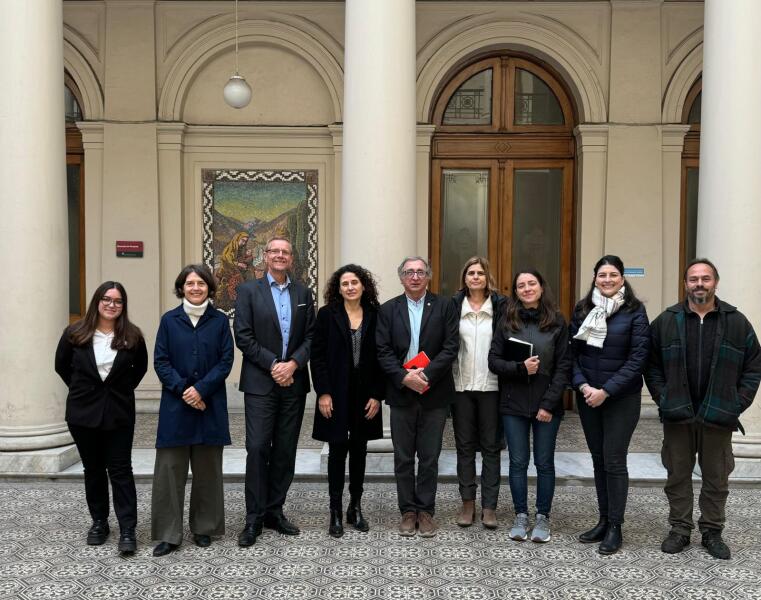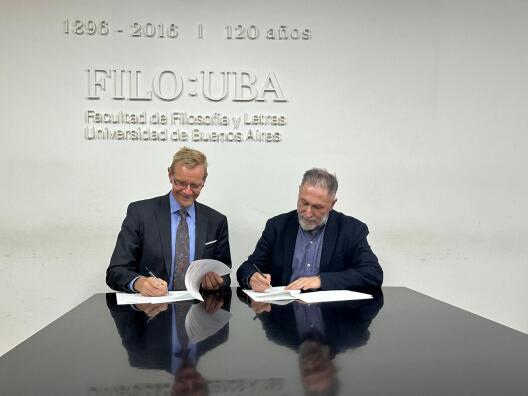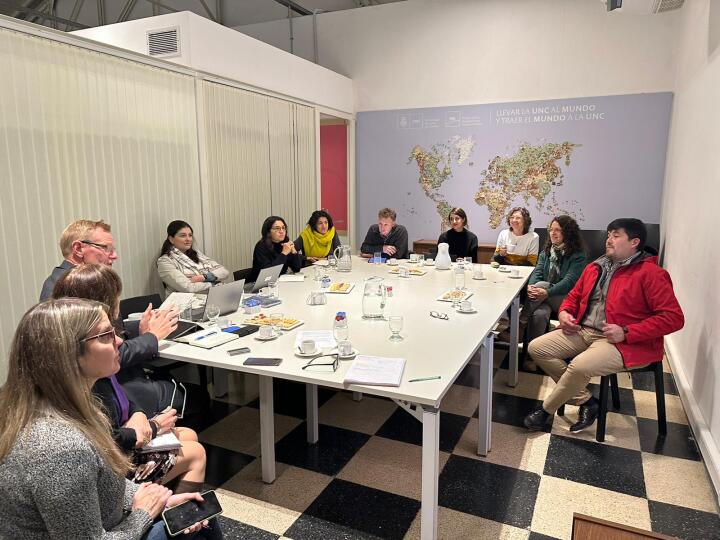The visit to Argentina included the signing of an agreement with the largest university in the continent

For someone who hasn’t yet been to South America, it might be surprising to know that it takes longer than 6 hours to reach Buenos Aires, in Argentina, from Medellín, in Colombia. The long flight marked the beginning of the second leg of the Brazil Centre’s fact-finding mission, which proved itself as rewarding as the first part.
If a culinary analogy is allowed, the visit started with an intriguing appetizer: a meeting with representatives from the German Embassy in Buenos Aires. Over lunch, Matthias Trager and Victoria Ehret offered a broad overview on the current Argentinian scenario, with emphasis of course in science policy. The country’s challenges are well known, however there are certainly possibilities for collaboration: there is an understanding that international scientific collaboration is a strategic issue and therefore must be continued by research and funding institutions. Besides, the tradition of high-quality teaching and scientific excellence remains as the society is a strong supporter of Argentina’s academia.
The country is also a longstanding partner of Germany and academic relations dates back many decades. A good example of this is the existence of the German-Argentinian University Centre (DAHZ/CUAA), a bilateral initiative hosted by the DAAD in Germany and the Education Ministry of Argentina. Hebe Leyendecker, the Argentinian Director, met the delegation of the Brazil Centre and shared the many successful initiatives between universities from both countries, which include joint masters’ and PhD programmes in several fields of knowledge, who then receive funding for the mobility of students and lecturers.
The meetings with local universities only confirmed the data available beforehand: there are several ongoing contacts between the University of Münster and Argentinian universities and at the same time, a lot of potential for future cooperation. The delegation carried with them a list of names of not only already existing collaborations, but also of scholars from Münster who are eager to start new partnerships with Argentinian researchers, as they are aware of the local excellence.

There were three visits in total: first, to the Universidad de Buenos Aires (UBA), the top Argentinian university and largest in Latin America, with an impressive number of five Nobel laureates. The meeting took place in the Faculty of Philosophy and Philology (Filo) and in the occasion of the visit the Dean has co-signed the first agreement between the University of Münster and his faculty from UBA. The partnership is endorsed by the Münster Department of History/Philosophy, in particular by Prof Dr Sarah Albiez-Wieck, Professor of Latin American History, who has been in contact with this institution for some time. This agreement is an important step towards the deepening of collaboration between both universities while providing an institutional framework for exchange activities. Besides, the head of the central International Relations Office of UBA showed great interest in expanding the collaboration for the whole university, which is also the goal of the Brazil Centre, so that researchers from other faculties of the University of Münster – including the natural and exact sciences - can be supported in their cooperation with scientists from the UBA.
The agenda also included a meeting at the headquarters of the National University of La Plata (UNLP), one institution with longstanding tradition of cooperation with German counterparts in many scientific fields. The current head of international affairs, Graciela Humbert-Lan is the former director of DAHZ, which provides another degree of proximity. The meeting enabled in-depth exchange of information and a fruitful discussion on potential avenues for collaboration. This included preparing projects aligned with the funding lines of the German Academic Exchange Service (DAAD) or Erasmus as well as innovative ideas such as the formation of a triangular partnership with Brazilian universities, which are also partners of UM. The meeting also identified promising areas for joint research that can be explored, such as battery development, sustainability, geology, archaeology and education between the UNLP and UM.
Photos

Last but not least, the delegation headed to Córdoba, where the oldest university in the country was founded: the National University of Córdoba (UNC). The meeting in the International Office was attended by were every collaboration partner of the University of Münster that the Brazil Centre was able to identify in its previous survey. Five researchers ranging from Pharmaceutical Biology to Political Science shared their experiences in and with Münster and were also informed about opportunities for maintaining their engagement with their counterparts. For instance, funding opportunities such as the WIRE-Programme or the COFUND project at Münster University can help to further promote Münster as a destination for research stays at UNC and widen the collaboration to other areas. In the meeting, the discussion also addressed the possibility of fostering Cotutelle doctorates as well as potential fields of collaboration such as business and digital humanities.
The visit to Argentina confirms what the pilot activities of the Brazil Centre during the past five years have already shown: Argentinian universities are good partners for joint activities in research and exchange in many different fields of knowledge, including major initiatives such as double degrees.



